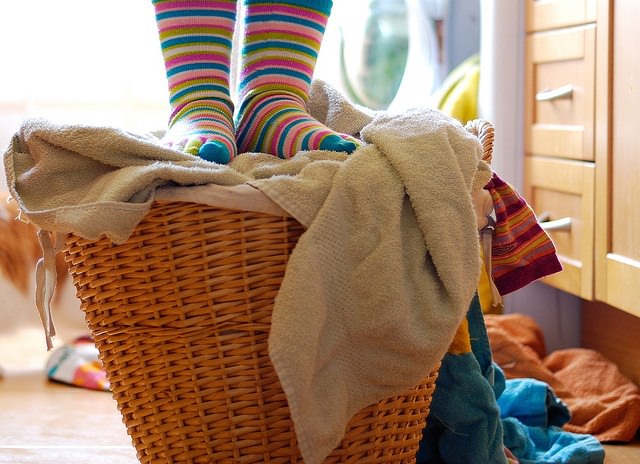
3 Natural Laundry Practices That Will Clean Your (Eco) Conscience Too
Making simple switches in your laundry routine can have a significant effect on your environmental impact. With these strategies, you can clean — and dry — your laundry in a sustainable way. Try these three natural laundry practices for clean clothes and a clear (eco) conscience.
This article contains affiliate links. If you purchase an item through one of these links, we receive a small commission that helps fund our Recycling Directory.
1. Switch Out Your Soap
If you are looking for an inexpensive, planet-friendly alternative to store-bought natural detergents, the first step is to look at what you are using to wash your clothing. Natural detergents are great but can be pricey, and corporate greenwashing makes it challenging to determine which detergents are really green, and which are just masquerading.

DIY Laundry Detergent
Making your own laundry detergent is far easier than it sounds. I’ve used this recipe for years; it’s easy and effective and doesn’t contain harmful ingredients.
Ingredients
Combine all the ingredients and mix well. Baking soda is an optional additive that serves to soften water and assist with deodorizing clothing. Store the mixed detergent in a lidded container, and use 1-2 Tbsp for each load. This detergent works well for energy-saving cold water washes and is also appropriate for high-efficiency machines.
2. Ditch the Softeners & Dryer Sheets

Conventional fabric softeners and dryer sheets both employ a stew of chemical compounds to coat clothes with unnecessary fragrances and additives. That coating from dryer sheets can even cause problems with your dryer. These natural solutions are so much safer and simpler. Instead of liquid fabric softener, pour a cup of white vinegar into the fabric softener dispenser. Alternatively, replace dryer sheets with wool balls.
Natural wool dryer balls are an excellent alternative to dryer sheets. Are you feeling especially crafty? Easily make your own by following this simple tutorial. Naturally flame retardant, wool dryer balls fluff clothing and reduce static. Adding a few drops of your favorite essential oil to the balls allows you to scent a load of laundry without coating your clothing in chemical-laden perfumed animal fat, which many brands use.
If you find that your laundry is constantly staticky despite adding vinegar and using dryer balls, try shortening your dry time by 5 to 10 minutes. The most common cause of static is over-drying your clothing. Cutting down dry time is gentler on clothing and saves energy too.
3. Do Without the Dryer

Reduce your energy use even further by avoiding the dryer altogether. The clothes dryer is one of your home’s most inefficient appliances and a huge energy suck. A clothesline is a truly amazing addition to your backyard. It changes laundry from a boring basement chore to an outdoor activity and makes your laundry smell great. For apartment dwellers or those with inhospitable winters (hello fellow Canadians!), a sturdy indoor drying rack serves the same purpose when outdoor drying isn’t an option. For those in dry climates, it also helps adds a bit of moisture back into the air.
I find that the absolute best shifts towards sustainability are like this: short, sweet, simple, and easy to employ. Creating small, sustainable changes means you are well on your way to an effortlessly green lifestyle.
Laundry day never looked so good!
Feature image courtesy of Kim MyoungSung. Originally published on January 6, 2015, this article was updated in November 2022.